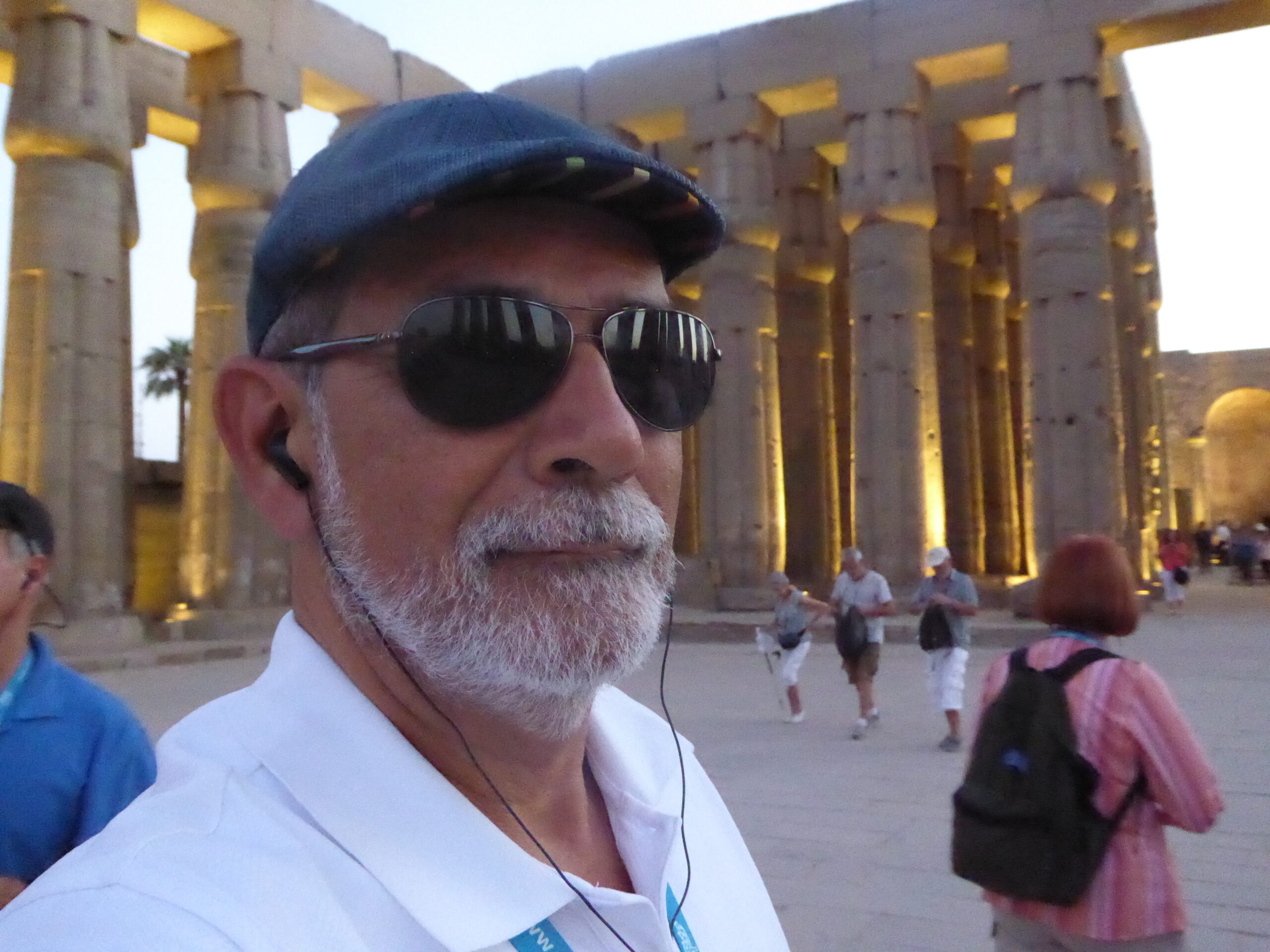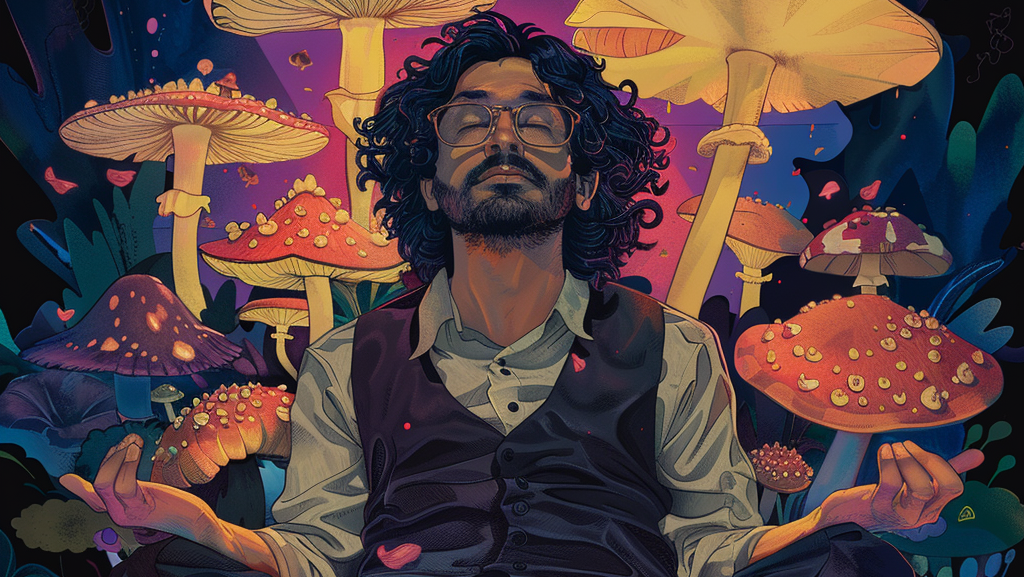Victoria, my maternal Abuela (grandma), was a force of nature, the mother supreme of the Castanon family. She fled Mexico and the Mexican Revolution at age fifteen and spent the next ten years of her new life working the fields from Texas to California. She did this with her man (my Abuelo) and a brood of children. Abuela made her way to northern California and worked the vineyards in Sonoma and Napa. She was always good with money and put away enough to buy her first house in Richmond. She quickly rose and recognized as “Doña” Victoria by the local Mexican community.
My mother was one of Victoria’s daughters and they all lived near her so I grew up with a a million first-cousins all living within a short walk of Abuela’s home. She was the sun, spitting out fire and light, and we all rotated around her. Abuela’s home was a palace as it had three bedrooms, two normal size and one really small, and two bathrooms. Abuela always seemed to be cooking as her house had a big kitchen that connected to the living room that had a real fireplace and a console TV. It was our nest where we all got together to talk, eat, and pay homage to Abuela. All my tias checked in daily at her home, often with my primos in hand, always ready to eat her Mexican food. I especially liked her tortillas and refried beans, both made with real manteca (lard). Weekends were always special at Abuela’s home as the entire family would gather Friday and Saturday evenings where the women shared local talk and news of family and any sales. My Dad and tios had their own table at one side of the living room where they played cards, drank beer, smoked their Camels or Luckys and swapped lies and tequila shots.
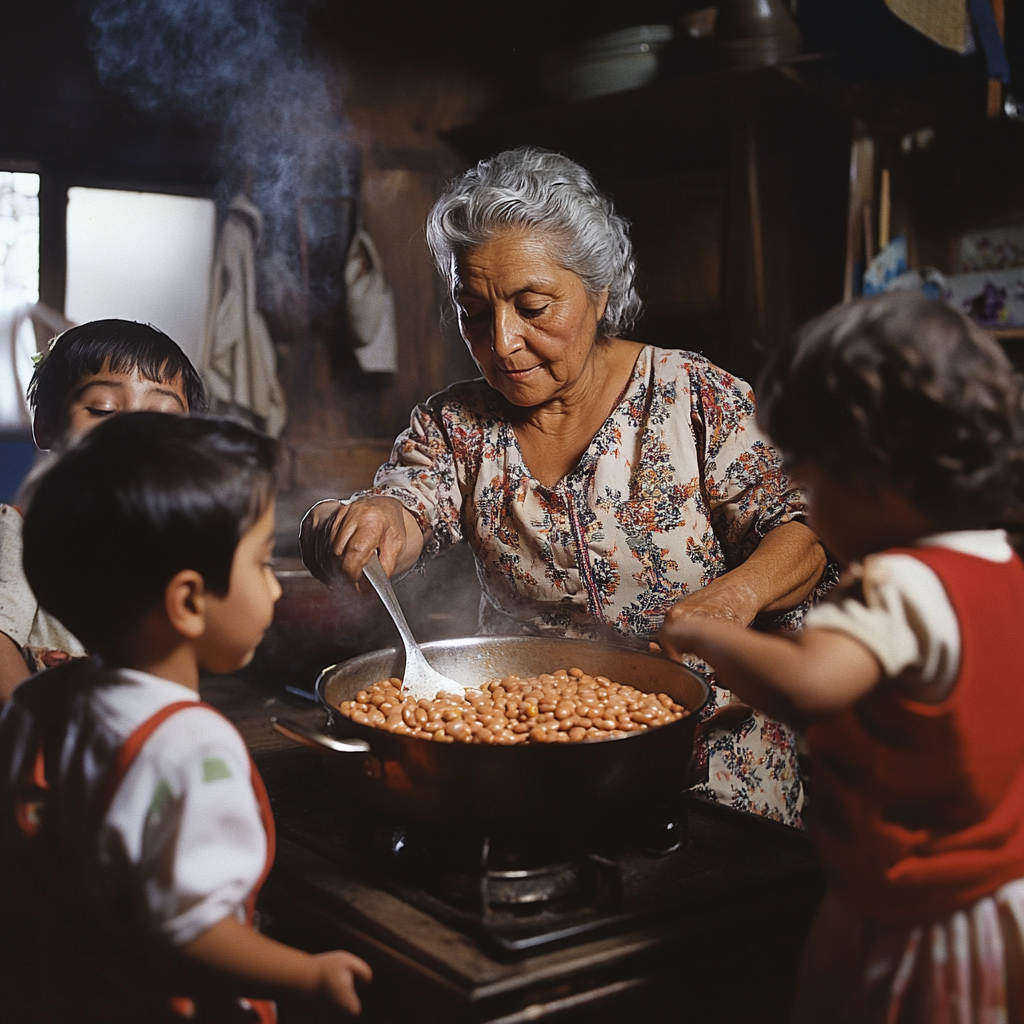
I was lucky to spend a lot of weekend nights at Abuela’s, mostly alone although on occasion a cousin would ask to spend the night. It was also a family tradition for my aunts to dedicate one or more of their girls to keep Abuela company and help with chores. The chores varied, from mopping the kitchen floor to buying her cigarettes at the local grocery store. As a boy I had different chores. I swept out the backyard and was often sent to find and bring home my alcoholic Tio Frank, a WW2 disabled vet and her only son. I knew where he hung out with his bar buddies. It never took too long to find and tell him that Abuela wanted him to come home for dinner and sleep off his latest binge. His bar buddies would make fun of him as I tried to convince my tio that it was time to go home. His buddies were mostly nice drunks and almost always gave me a bag of peanuts or a candy for my efforts.
Abuela lived at her home with my Tio Frank and Abuelo Juan, my grandfather. Abuelo was short, dark and muscular. He was still working as a welder back then and took good care of the house. Most of the time he didn’t talk much to the family but he liked me and always asked me about school and the things I was learning. I knew he loved and feared Abuela and she was the boss. He was her second husband as the first one, my biological grandfather, had left for Mexico after spending time in San Quentin for supposedly killing a Portuguese guy in North Richmond, the really bad side of town.
My Abuela suffered from asthma and diabetes but enjoyed her lifestyle, which included annual stays of three to five months in Calexico, just across the border from Mexicali. She went there every summer for her curada, where she bought her botanicas and consulted with one or more of the local curanderos. Abuelo Juan was always sad when she left him for the curada so I tried to visit him daily on my way home from school. My mother wanted me to check on him as he often drank himself into a stupor and would forget to turn off the stove or leave the garden hoses on. As this piece is about my Abuela and my dad’s tequila duel in Baja, I’ll defer the story about the day I found him hanging in the living room and the crisis of faith that tore me from the church and some of the family.
Everyone knew I was probably abuela’s favorite. Even back then it was clear to me that all my male cousins were jealous of me as I was the one she most frequently asked to spend weekends at her home. It was a pretty good deal for me although I didn’t like hearing Abuela’s nasty comments and disdain for my father. She made it a point to tell me that my dad was too smart for his own good and while he was a good provider, he was also a gambler, drank too much, and was not a good husband. She called him a sin verguenza (shameless) macho and told me to avoid his bad ways. I think my mother filed for divorce five or six times before I graduated from high school. Abuela told me that she gladly gave my mother the money to file the divorce papers. Mom never followed through as she always relented as she wanted my father in our lives. Dad could be a very charming and persuasive man who would change his ways for a bit and spend a little more time at home with us but would always revert to his true nature. Still, I know he loved my mom as best he could.
Back to the time Dad and Abuela spent a hot day in the desert trading insults and tequila shots on the way to Cucapah. Dad and I made regular runs every summer to see his older brother and family who were farmers in a communal farm, an ejido, called Cucapah about two hours south of Mexicali. A few weeks before each run, we would make the rounds of the family and collect used clothing, old furniture, and whatever else could fit into our current pickup truck. It was a 51 Chevy that year. The ritual was to make our way to Cucapah the first week that my school let out for the summer and be gone for a week or so. At the end of our visit, we would leave all the stuff with the family, often including the pickup truck and make our way home via Tres Estrellas de Oro or some other cheap Mexican bus company.
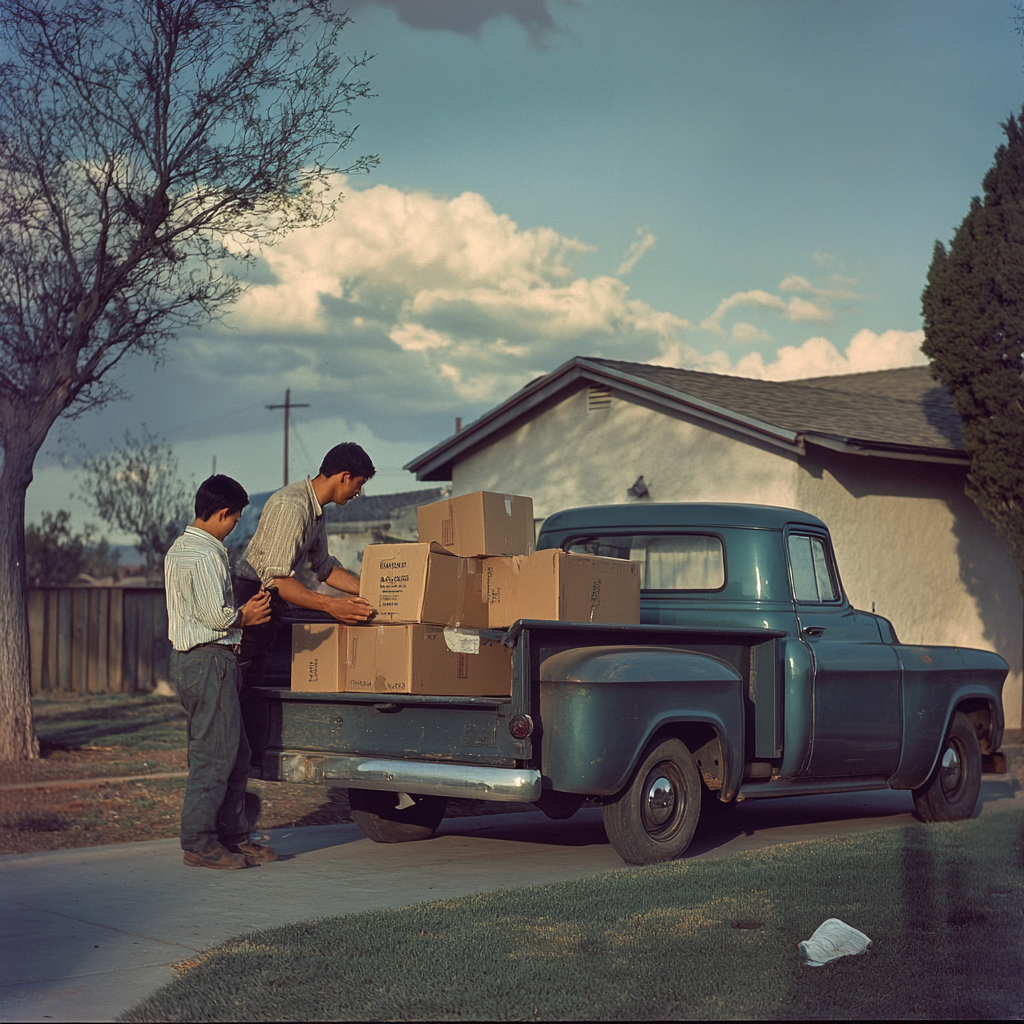
We started on our pilgrimage that year just after school ended. We took the 99 highway as the interstate 5 was still years away. I had just turned fifteen and it was a scary trip as the pickup’s load was constantly shifting and we had to stop several times to tie everything down. Dad also drove most of the time with one hand on the wheel and the other one holding a beer. On this trip we were stopped by a California Highway Patrol motorcycle cop outside of Visalia as dad had been weaving in and out of traffic. The CHP guy was at the end of his shift and rather than give us a ticket told dad to move over and let me drive. I only had a driving permit at that time but it was good enough to get us back on the road with me driving. It took us twelve hours that first day but we finally arrived in Calexico, and we checked in at a Motel 6.
I’ll always remember that night as it was the first time I stayed at a motel. Dad gave me fifty cents and I splurged and enjoyed the bed’s magic fingers for an hour, 25 cents for every thirty minutes of ecstasy. Dad conked out quickly and I watched TV most of the night while he slept and snored away. We got up early the next day and made our way to my Abuela’s for coffee as she wanted to make sure we were doping OK. She saw that my dad was crudo (hungover) and insisted that she go with us to Cucapah to make sure we arrived safe and did not get into a wreck. Dad was too crudo to say no, so after a quick breakfast of coffee, tortillas and beans the three of us got into the pickup. Dad took the wheel and we drove across the border to Mexicali after giving a Mexican border guard a few dollars to let us pass without an inspection of our load of stuff.
As soon as we got outside of Mexicali Dad stopped for gas and told me to take the wheel. Abuela nodded in agreement. I was nervous about driving as the road was filled with potholes and an endless stream of rabbits ricocheting across the road. Then there were the trucks lumbering on the road with bald tires and tired drivers moving in and out of the fields to the crowded road. It was harvesttime and the trucks were loaded with tomatoes, corn, lettuce and other vegetables that jumped off the trucks every time they hit a pothole. There were crushed crates and busted boxes on both sides of the road as I quickly figured out what to avoid nd what to run over. I tried hard to avoid running over the dead and dying rabbits that littered the road. Abuela kept her eyes on me and the road and said little during that first part of the ride as she smoked her Salems in between inhaling her asthma mixture. The air smelled of diesel and burnt herbs as I looked through a green haze at Durer vision of life and death in the desert. Dad slept most of the time although he jerked awake when we were hit by an unavoidable pothole.
I had driven for about an hour and we were about thirty miles past Mexicali when Dad told me to pull into a descanso, a roadside stand. This one was called El Faro and I knew it from previous trips to Cucapah. It was it was only roadside stop where the local campesinos and travelers could buy cigarettes, and stock up on beer, tequila, sodas, candies and other bagged or canned items. El Faro had always been a pit stop for us as it was located at the turnoff to Cucapah, another half hour down on a gutted gravel road bordered by endless fields of corn and squash. It was the only descanso near Cucapah with a gas pump, often empty or not working. My Cucapah cousins always counted on me to pick up some candies and maybe a few sodas at El Faro before arriving at their home. El Faro also had a couple of rickety outdoor tables with stools where we could sit and have a snack or drink. That day there was a small group of men, mostly middle-aged farmers and truck drivers, at one of the tables drinking beer, playing dominos, and smoking their Delicados or hand-rolled cigarettes. They looked at us as we went to the other table as we were obviously not locals or tourists. They kept an eye on us the entire time we were there. The would occasionally look our way, mutter something to each other, and get back to their cards or dominos.
Dad and Abuela sat down at the fold up table and the jefe asked what we wanted. Dad asked for a bottle of house tequila, two shot glasses, and a Fanta for me. The jefe started to walk away when Abuela called him back and told him to bring his best bottle of tequila, not one that the pobres (poor ones) drank. He brought out a bottle of reposado along with a Fanta. The Fanta was lukewarm and I drank it keeping my fingers on the bottle lip to keep the flies from diving in for a dip. Dad and Abuela had not talked much since leaving Mexicali but that changed once they had their first shot. I thought it wise to say nothing and observe so I moved my foldup chair to the shade and pretended to read one of the Marvel comics I was taking to my cousins. It was a great batch as it I had most of the cool titles, from Marvel’s Fantastic 4 to Spiderman and I had thrown in a few Conans for the boys and some Little Lulus for the youngest. The comics were in English and I knew that my seven cousins and I would spend hours as I read the comics in Spanglish. Up to that day I had never seen Abuela take more than a sip of any alcohol but I knew it would be a special day.
Back home I was use to Mexican men arguing over who would offer the first toast as women never did so. But not that day. Dad poured her the first shot and as soon as he poured his own Abuela raised her glass and said “Pity the good women who love their men more than themselves, may the Lord give them strength to say “basta” and find some peace.” Dad nodded his head, smiled at her, raised his glass to hers and said in Spanish “Let’s drink to those we left behind, especially the viejas who keep the devils from chasing us to our new land, our new homes.”
Our time at El Faro lasted about an hour in real time although I still feel the afterglow some sixty years later. It felt right to witness these two tectonic family forces scrape and slide across each other. It was a magnitude 10 event unfolding in the high desert at the foot of several dead volcanos and an infinite expanse of desert scrub. Their tequila spar was beautiful and raw. There were moments when the verbal barbs drew blood. I was honored and scared to see the two blood rivers of my life create a new current that forever flows and protects me over the time that remains.
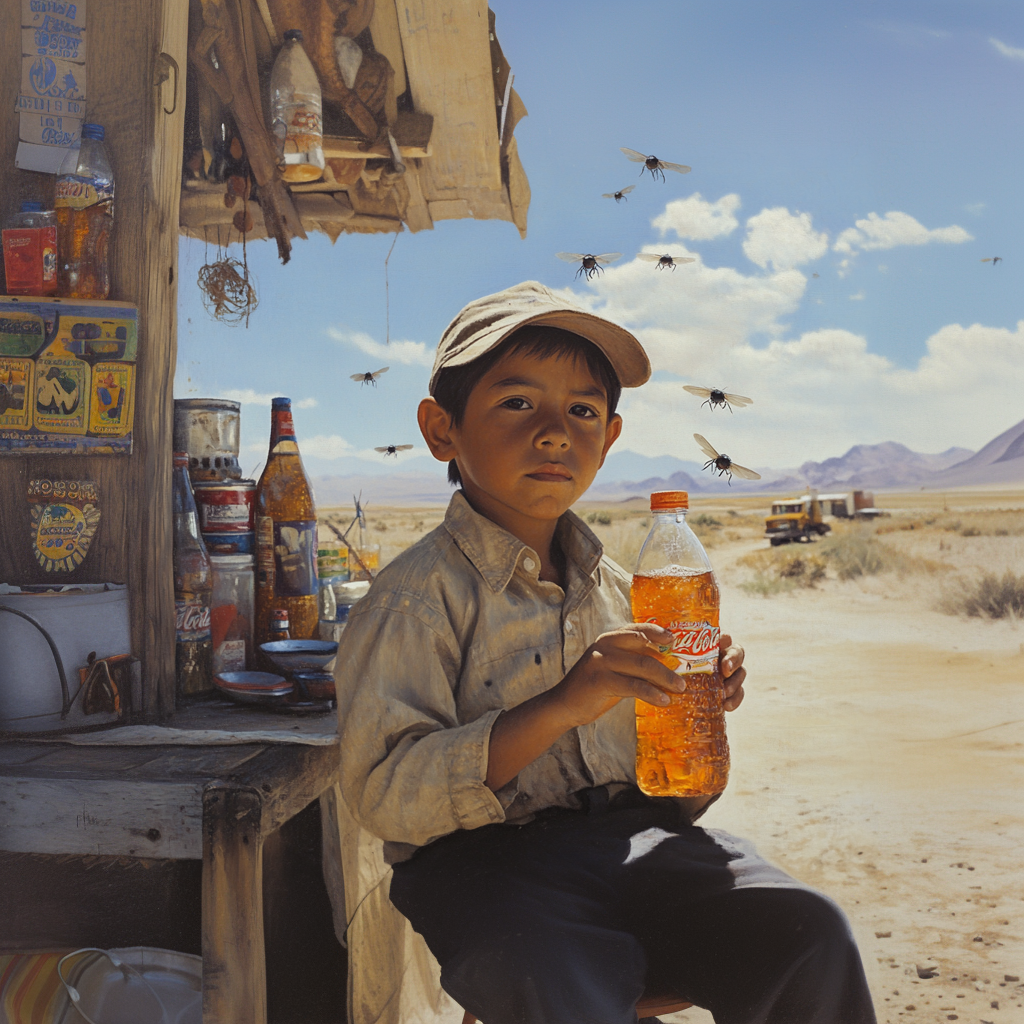
The sun was merciless that day and the flies were obsessed with my Fanta. I gave it up and offered the Fanta to the flies. Dad and Abuela would throw me 0ccassional glances as I pretended to ignore them and read my comics. I liked the way they kept their voices low as they traded insults and innuendos, always clear and calm. I admired their control and rhythm. First a shot, then a few moments to breathe in the agave, then a few words with sharp barbs and then another pour while the shot is returned.
A couple of times they drew blood like when Abuela asked Dad if he had warned me about my rumored half-brother and sister living in the north side; she said her friends told her that there was another Duran nest close to where Dad worked. He ignored her and made jokes about her leaving the Mexican revolution to women who stayed behind to fight while she headed north. Then he remarked that the old Mexicanos in town still talked about how she bought her first house. He asked her how hard it was to use the profits from the supposed robbery and murder committed by her first husband who spent time in San Quentin and then fled to Mexico. Dad said it was a high price to pay for a home and that while she profited was my blood abuelo and had served time in San Quentin, to finance her home. Dad told Abuela that her world died when she crossed the border and that things were different for him and the other new crossers who came to help win the war. Abuela in turn said that real men are more than a set of huevos, bad habits, and poor manners. Dad told her that real men spit in the faces of those who hide behind a woman and lack the huevos to uphold the family honor. After they drained the bottle of tequila my father asked for another one but my abuela told him that his family was waiting and that he was already drunk enough and should go take a piss and throw some water on his face.
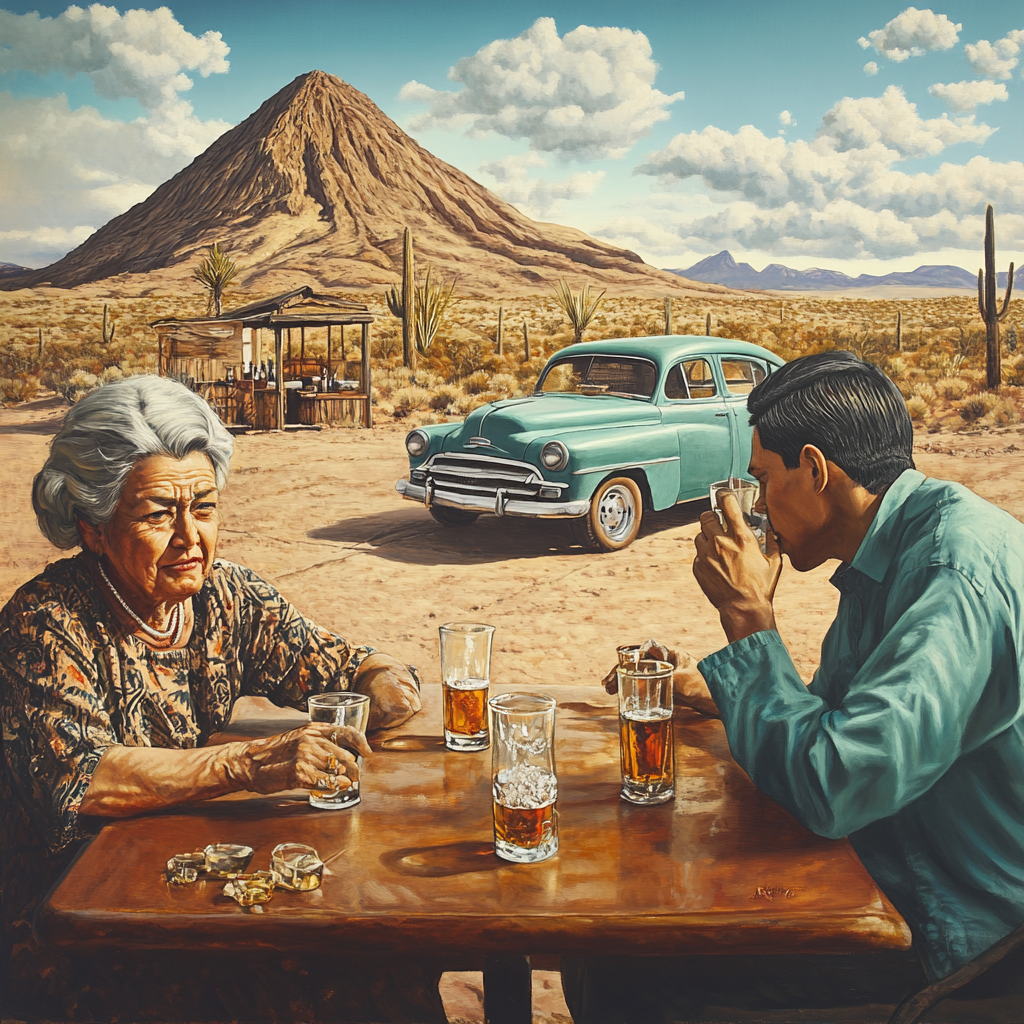
I expected Dad to ignore her, but he looked at her and said, “Que senora fuerte eres, como un buen hombre” which translates to “What a strong woman you are, like a good man.” He took her advice and hobbled off to do his thing. Abuela tuned to me and said in Spanish that my father was too drunk to drive us into Cucapah and that I would have to do so. I said OK and we made our way into Cucapah and after two hours we were welcomed with a glorious reception by the Duran family. They were thrilled to see us and quickly emptied the truck of all the boxes and used furniture. Dad was just shaking off his stupor as we got off the truck. After lots of kissing and abrazos from our side he introduced my abuela. In flowery terms he told them that my abuela had survived the Mexican revolution, had made her way to California where she worked hard, and was the Doña of the family. He was respectful as she smiled, held out her arms, and embraced our family. She was magnificent and Dad smiled, a rare thing to see.
I think back and recall how spellbound I was to see the two most powerful influencers of my life fight and toss insults at each other as the tequila liberated their words and souls. From that time forward my father stopped saying negative things about my abuela in front of the immediate family. After that sunbaked day in the desert my abuela also moderated her verbal criticism of my father in front of me and said that I had a papa with huevos who was not afraid of man or woman.
